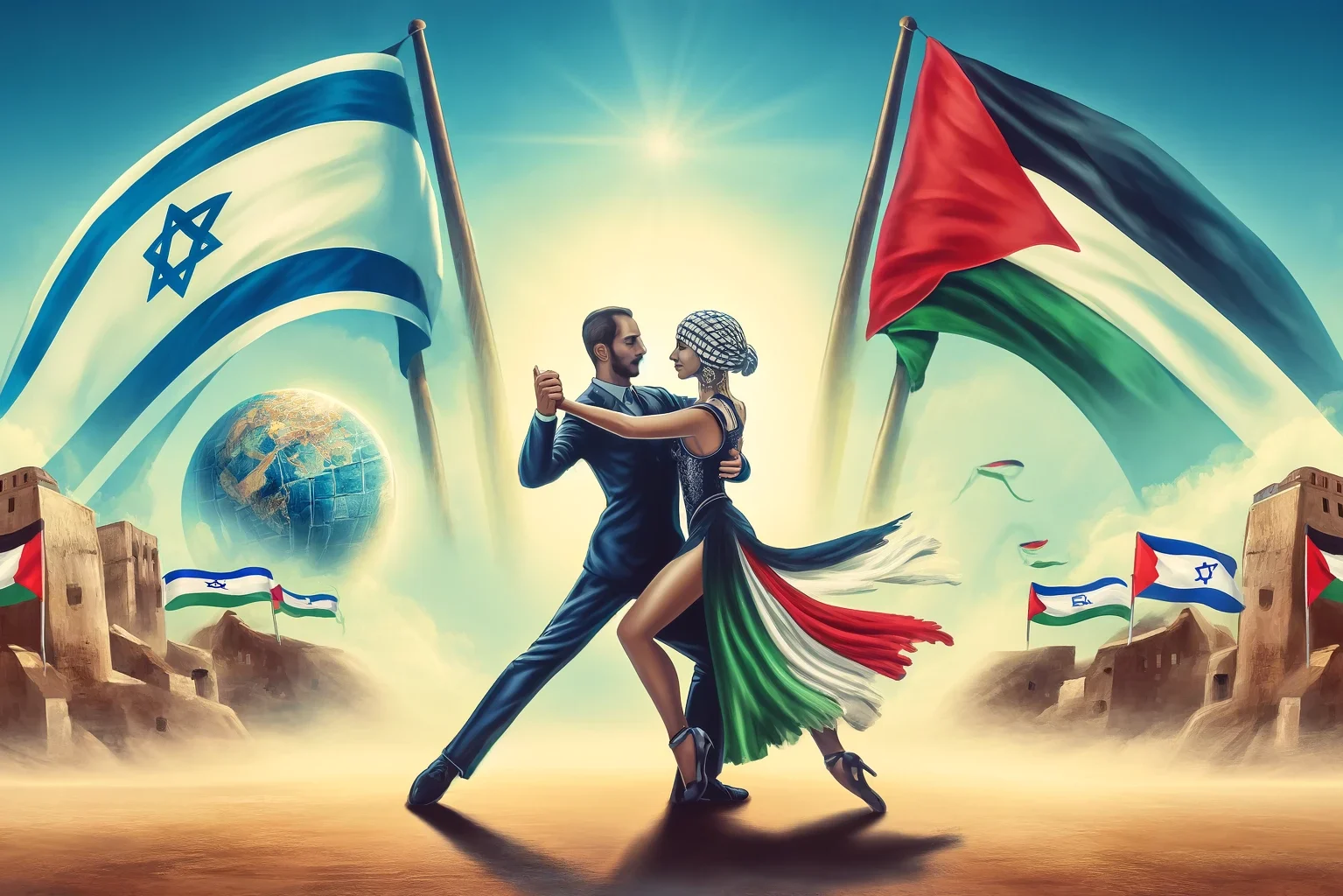Extremism Only Generates Blood, Fear, and Tears
While Israel needs to rid itself of the influence people like Ben Gvir and Smotrich have on their government, the Palestinians also need to rid themselves of the ruthless armed and radical insurgents.
[Ramallah] Already into the eighth month of Israel’s war in Gaza, there seems to be no end in sight. Israeli concerns about the fate of the captives are legitimate, as are the worries of Palestinian civilians in the Gaza Strip, who have paid a dire price and have yet to see any hope that their plight will soon end.
The public in Gaza is frustrated by the Palestinian Authority’s (PA) limited resources to help them. People are enraged by Hamas’ indifference to the skyrocketing death toll among Palestinian civilians, and by the Arab countries’ impotence, which has so far yielded no substantial moves to end the Israeli war and develop some sanity.
Ever since June 2007, when Hamas militarily took over the Gaza Strip, I have heard from Gazans about their discontent and frustration because of Hamas’ behavior and its ruthless treatment of non-Hamas Palestinians. The approach that the movement adopted when it was founded in December 1987 and has continued in all the ensuing years considers any non-Hamas member/supporter to be an enemy, be they Palestinian, Arab, or Israeli. As long as Hamas continues to believe and behave this way, there is no chance that it will ever return to be a regular and integral part of Palestinian society, which is built on accepting and not denying the existence of the other.
An approach like that of Hamas is never life-affirming. On the contrary, it is a recipe for humanity’s slaughter. Why? Whoever believes that “if you are not with me, you are my enemy” opens the gate wide for endless conflicts between people divided not only by politics but also by social, economic, racial, religious, and any other kind of difference you might think of.
The October 7 attack created new dynamics, opening an unprecedented chapter in the history of the Arab-Israeli conflict. Hundreds of armed Hamas operatives stormed Israel’s southern border, coupled with hundreds of plainclothes civilians.
Two tracks of violence occurred the moment the border was breached. Hamas fighters headed to army camps and frontline facilities that belonged to various Israeli security agencies and returned to Gaza with advanced equipment and male and female soldiers as hostages.
Those who attacked the southern towns were of a different caliber of people. They were ruthless, violent, and bloodthirsty beyond description. Some had firearms; others had knives, swords, canes, and shovels. Some dashed through the fences, running and jumping over them. Others were barefoot or limping, assisted by one or two canes. It was a surreal scene that you might think came from the imagination of filmmakers. But it wasn’t a movie. It was the ugly reality the Israelis lived or died in. At the same time, on the Palestinian side, some considered it a day of comfort and satisfaction, seeing the shattering of Israel’s myth of the “invincible army.”
What was done in the southern towns of Israel was something not a single sane Palestinian would condone or justify. It was something that every Palestinian should be ashamed of—nothing less and nothing more. However, not condemning Hamas’ actions should not be taken to mean that people, by default, support them. Populism always plays a role in times of crisis. Outspoken officials or community leaders prefer to stay in their comfort zone where they avoid controversial criticism of what Hamas did, silently hiding behind what the occupiers do to the Palestinians, day and night.
I don’t want to speak of the ongoing Israeli occupation and the kind of frustration it continues to create within every Palestinian soul. We Palestinians look around but see no opening in the sky, described by the whole world as a no-limit zone. In Palestinian perception, this sky has unseen limits that only Palestinians feel. Those limits suppress hope and optimism and deny them to those living under occupation in the territories that Israel conquered in the June 1967 war.
Hamas’ armed and uniformed operatives told a different story. Rumors that spread on social media in the first few hours after the attack created a majestic image of Hamas’ Nukhba, the elite and well-trained commando force of the Izz ad-Din al-Qassam Brigades. Numerous social media posts spoke of the Palestinian blitz in which armed Hamas men stormed army bases and facilities belonging to various intelligence organizations. These organizations had been monitoring every movement in the Gaza Strip using advanced camera-equipped drones and balloons that showed every centimeter of the area and its inhabitants. These operatives were perceived as the new Palestinian supermen. The media magnified their role, and the public believed it.
Palestinians find it hard to distance themselves from Hamas. They believe in national unity, which unites all segments of the Palestinian people. However, it is not up to the Palestinian people to include Hamas in their fabric; the onus is on Hamas to change. Will it change? I doubt it. I hope someone in Hamas openly challenges me by accepting the PLO international treaties and agreements, endorsing the two-state solution, and abiding by the principle of “one law, one gun” in the future State of Palestine.
In Israel, it is almost a mirror image. Most Israelis oppose the extremist stands, statements, and actions of ministers like Itamar Ben Gvir and Bezalel Smotrich, yet they never exclude them from the population records. They remain an integral part of the Israeli people, or this is what I believe. Frankly, I’d love to see us, the Palestinians, succeeding in uprooting violence, racism, and hatred, but I know many would disagree with me as they look at what happens in Israel and argue, “Why should we behave differently?”
In closed Palestinian circles discussing the postwar Gaza Strip, people avoid explicitly stating that they want to exclude Hamas from Palestinian politics. Instead, they suggest taming Hamas, disarming its military wing, and integrating it into Palestinian society under Palestinian rule. Some believe this is achievable, while others, including myself, doubt it because Hamas inherently remains unchanged. I fear Hamas will continue its destructive role and is not prepared to endorse the two-state solution, where Palestine and Israel coexist peacefully with mutual respect.
Let’s face it: The awkward reality is that the blackmailing of Israeli Prime Minister Benjamin Netanyahu, from the beginning of the war in Gaza until today, by his ministers Smotrich and Ben Gvir, has brought him, along with his defense minister, Yoav Gallant, face-to-face with the International Criminal Court (ICC). The Israeli government’s reaction to the events of October 7, driven by hatred and vengeance, laid the groundwork for the accusations against Israeli policymakers and military officers. While it’s too early to predict the ICC’s decision, the prosecutor intends to request arrest warrants for Netanyahu, Gallant, and Hamas leaders Yahya Sinwar, Mohammed Deif, and Ismail Haniyeh.
Regardless of the verdict, history will remember the defendants on both sides differently. Some will view them as making grave mistakes, while others may see them as heroes of their time. As contemporary witnesses, we must openly express our thoughts on the events before and after October 7.
History didn’t start on October 7, 2023, June 5, 1967, or May 15, 1948. Since the Balfour Declaration in November 1917, our region has been plagued by conflicts, leading to today’s situation. The pain experienced by both Israelis and Palestinians should catalyze leaders to say “enough is enough” and move toward a peaceful Middle East. Is this too much to hope for? I don’t think so.
Hamas is an opposition group to the PA and the Palestine Liberation Organization (PLO) and will remain so until proven otherwise in future elections. Meanwhile, just as Israelis expect Palestinians to distance themselves from Hamas, it is our right to urge Israelis to distance themselves from extreme right-wing warmongers. This mutual distancing is beneficial for both sides. Senior officials in the PLO, Fatah, and other factions believe that unilateral compromises with Israel are no longer helpful without reciprocation. It takes two to tango, and our Middle East needs many couples to dance to this tune.


